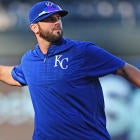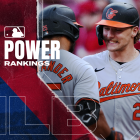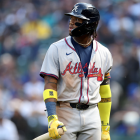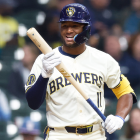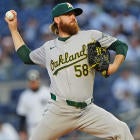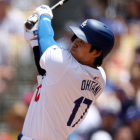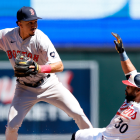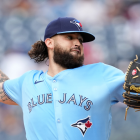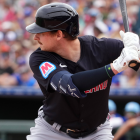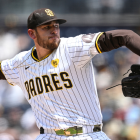Free agents still unsigned. Market slow to develop. When will they sign?
Blah, blah, blah. We know the intro. I get it. You get it. No need to constantly rehash.
For purposes of this exercise, though, let's consider the six unsigned players who rejected qualifying offers and still remain unsigned (Wade Davis rejected it but signed a three-year, $52 million deal with the Rockies. So did Carlos Santana, but he got three years and $60 million from the Phillies. Lorenzo Cain did as well, but signed a five-year, $80 million deal with the Brewers).
Eric Hosmer, Mike Moustakas, Jake Arrieta, Lance Lynn, Alex Cobb and Greg Holland all rejected qualifying offers in order to hit free agency.
If they had a do-over, knowing the climate of this offseason, would any of them reconsider and take the offer? A qualfying offer for this next season was a one-year, $17.4 million deal.
Something to keep in mind here is the luxury tax situation. It looks like the Red Sox are going to be over the threshold, but the Yankees, Dodgers, Tigers, Cubs and Giants appear to be coming under. All of these teams would be paying a 50 percent luxury tax fee in 2018 if they passed the threshold. If they went over for this season, they'd again be paying 50 percent tax for 2019. The tax is on the overage, which means if a team is $5 million over, they owe $2.5 million in tax.
Given that next year's free agent class is loaded with the likes of Bryce Harper, Clayton Kershaw (assuming he opts out), Manny Machado, Josh Donaldson and much more, it behooves the teams to get under the tax. Think about it: if anyone is assuming they'll get someone like Machado for $30 million a year, but is paying a 50 percent tax and over the threshold, they're essentially taking a $45 million salary hit per year on Machado alone, including the tax, for every year they're over the threshold.
With all these presumably big-spending teams free from the tax heading into next offseason, it's entirely possible there will be a lot more spending.
Given this and knowing that each of those huge names can only be signed by one team each (if there are five teams in on Harper, that means there are four losers with money to burn elsewhere), maybe it would be worth it for this season's free agents to take one-year deals and hit the market next year.
That is, if you're J.D. Martinez, what about a one-year deal -- or maybe a bigger deal with an opt-out after 2018?
With this in mind, let's look at the six aforementioned QO players. Keep in mind, this is a discussion based in the reality that teams just aren't offering what many think they should. I'm not saying the teams are in the right. I'm merely discussing this knowing what is happening.
Eric Hosmer
There's a report that has yet to be meaningfully shot down that Hosmer has a seven-year, $140 million deal on the table from the Padres. He would easily be the best first baseman on the market next season, but he's the best this time around and has a $140 million offer. Why in the world would he take one year and $17.4 million? He's a no.
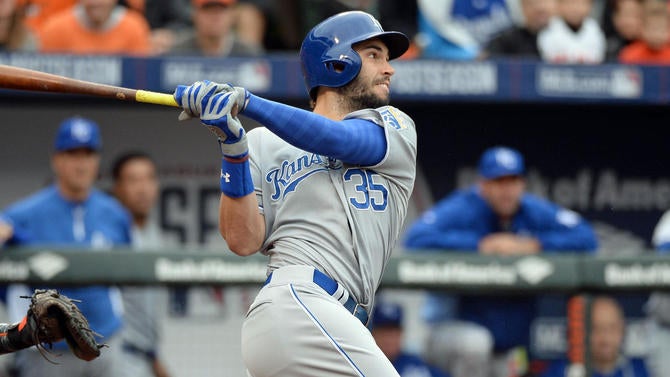
Mike Moustakas
Machado wants to move to shortstop in free agency, so Moustakas would be the second-best third baseman after Donaldson, who is three years older and would be entering his age-33 season. With many more bidders, the market would likely be better for Moustakas. We've barely heard a whisper about interested teams this offseason.
I think if he had a chance to take the qualifying offer now, it's very possible Moose would do it. Take the $17.4 million for 2018 and then get more bites next offseason for a longer-term deal.
Jake Arrieta
Unless David Price has an excellent bounce-back year and opts out of his deal, Arrieta would probably be the third-best starter next offseason after Kershaw and Dallas Keuchel. As with Moustakas, we've barely heard anything about Arrieta other than that maybe teams will start to consider short-term, high-salary deals. We saw how a one-year "show me" deal for Dexter Fowler was parlayed into the long-term deal the following offseason, so maybe it would work here with Arrieta.
Given what we know about Arrieta and his agent, Scott Boras, he wouldn't take the qualifying offer if he had a chance to make that decision again right now. I think he should, though. He's a confident guy. If he bets on himself on a one-year deal and pitches like he did in July-August last year (1.69 ERA in 11 starts), he'd get his huge money next offseason.
Lance Lynn and Alex Cobb
The two are being forced to wait out the Yu Darvish/Jake Arrieta markets. They are stuck as relative hostages in the situation, waiting to see where the bar is set while also being ready to see teams who lose out on Darvish pivot to them as second or third options. If they hit free agency next offseason, they'd each be a second full season removed from Tommy John surgery and there would be more big-market teams moving the market.
I think both would be wise in our fictional scenario to take the qualifying offer. Cobb hasn't even made $17.4 million in his entire career and Lynn made just $7.5 million last year. Take the pay raise and then have a good season before a huge payday.
Greg Holland
Relief pitchers are the one thing teams have paid for this offseason. Lots of relievers have signed. Nearly all the big names. Just not Holland. $17.4 million is almost three times what he made last year.
On the other hand, there aren't any teams with a glaring ninth-inning weakness right now who seem to still be bidding on late-inning relievers. Next offseason, the following right-handed relievers hit free agency: Craig Kimbrel, Jeurys Familia, Kelvin Herrera, Cody Allen, David Robertson, A.J. Ramos, Brad Brach, Carter Capps and more. Mercy.
In Holland's last 19 outings last year, he had a 8.47 ERA and blew three of his 10 save chances.
I think he still needs to get anything he can this offseason. Given the market for relievers, surely he'll still get more than one year and $17.4 million. Right?













